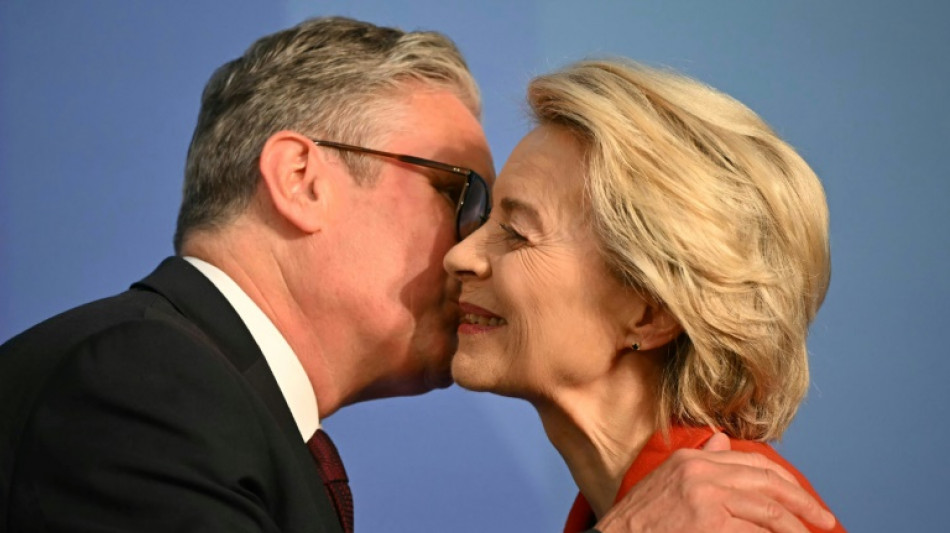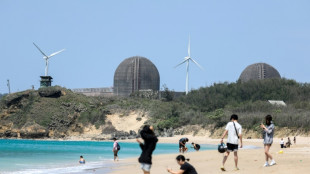

Under pressure from hard-right, Starmer takes cautious approach to EU 'reset'
Prime Minister Keir Starmer is treading a fine line on UK-EU relations as hard-right populists make gains at a time when Brexit and immigration remain toxic issues in Britain.
The Labour leader will host European Union chiefs in London on Monday for a major summit designed to progress a deeper relationship between the UK and the bloc than the one negotiated by the previous Conservative government.
But Starmer will be wary of giving ammunition to arch-Eurosceptic Nigel Farage's Reform UK party, while also conscious that US President Donald Trump views the EU negatively.
"He's walking two tightropes at the same time," said British foreign policy expert Richard Whitman, describing immigration as a "salient" issue in the UK and Trump's attitude to the EU as "hostile".
"Starmer is balancing this big international issue and also the domestic politics one, and that's what makes it so tricky for the prime minister," the politics professor told AFP.
The anti-immigration Reform was founded in 2018 -- two years after Britons voted to leave the EU -- as the Brexit Party, with the aim of advocating for Britain to depart the bloc without a withdrawal agreement.
Renamed the Reform UK Party in 2021, it has gained significant ground.
Last month, it won more than 670 local council seats, its first two mayoral posts, and gained an additional parliamentary MP in local English elections.
Farage's upstarts are also leading national opinion polls as they tap into concerns about net migration, which stood at 728,000 in the 12 months to last June, and the struggling economy.
Starmer hopes closer relations with the bloc can spur his main ambition of economic growth but he has vowed to honour the Brexit result, not rejoin the single market, customs union or return to free movement of people.
He has been publicly reticent about an EU-proposed youth mobility scheme that would allow British and European 18- to 30-year-olds to study and work in the UK and vice versa, although the UK government has made warmer noises in recent weeks about a possible controlled programme.
An announcement seems unlikely on Monday given that it comes just a week after Starmer said he wanted to "significantly" reduce immigration in a speech intended to appeal to potential Reform voters.
"To announce something like that would be a bit perilous politically," said Whitman, deputy director of the Global Europe Centre at the University of Kent.
- Left-wing vote -
Starmer and EU bosses Ursula von der Leyen and Antonio Costa are instead expected to seal a defence pact at the summit -- a deal seen as the lowest hanging fruit for negotiators.
"There's nothing in his proposals that is a dial-shifter in terms of economic growth," said Anand Menon, director of the UK in a Changing Europe think-tank.
While Starmer is squeezed on the right, he is also under pressure from pro-European lawmakers within Labour who want him to get closer to the EU.
"We must not let Brexit hold us back from our national interest," Stella Creasy, chair of the Labour Movement for Europe group, told AFP.
"Both sides must move on from the disagreements and red lines to seeking to reduce the paperwork and red tape we face as a result."
A poll for the internationalist think-tank Best for Britain last month found that 53 percent of voters believe a closer relationship with the EU would be positive for the UK economy.
Britain's traditional third party, the Liberal Democrats, wants to rejoin the single market and is also surging in popularity, as are the left-wing Greens as UK politics fractures.
"I think Labour are underplaying the danger of losing votes to their left," said Menon.
He thinks Starmer -- who voted to remain at the 2016 referendum -- can afford to be bolder considering his 156-majority in parliament and the fact that Reform only has five out of 650 MPs.
"Everything is done in a sort of defensive crouch," Menon said of the prime minister's approach.
"It's kind of apologetic, rather than, 'This is what I think is good for the country, this is why I'm doing it'.
"I would advise him to start winning the argument."
D.Fischer--NRZ




